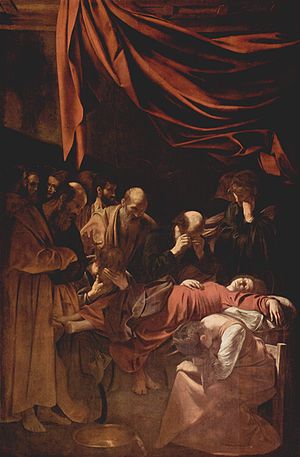 Those Christians who are not Orthodox –as in, Orthodox Christians or Eastern Orthodox or some version of this– are likely not to be aware that today begins the traditional time of fasting in preparation for the great feast of the of the Assumption (if you are Catholic) or Dormition (if you are Orthodox) of the Blessed Virgin Mary (Theotokos), the all-holy Mother of God. In fact, the Churches of East and West are called upon to prepare for the yearly festival of our Lady by prayer, fasting and almsgiving. Sound familiar? Indeed, the 3-point spiritual discipline is identical with Lent and Advent.
Those Christians who are not Orthodox –as in, Orthodox Christians or Eastern Orthodox or some version of this– are likely not to be aware that today begins the traditional time of fasting in preparation for the great feast of the of the Assumption (if you are Catholic) or Dormition (if you are Orthodox) of the Blessed Virgin Mary (Theotokos), the all-holy Mother of God. In fact, the Churches of East and West are called upon to prepare for the yearly festival of our Lady by prayer, fasting and almsgiving. Sound familiar? Indeed, the 3-point spiritual discipline is identical with Lent and Advent.
The period of fast I am speaking of today is a period of time that ought to be understood as training ourselves to be spiritually vigilant. That all of us, no matter of Church membership, should be attentive to and practice fasting so that our hearts and mind and bodies are opened up to the workings of the Holy Spirit. Put another way, by fasting what could the Lord be offering us to know and love and live? Our prayerful vigilance for the feast of the Assumption/Dormition ought to be rekindled by Catholics because the practice opens us up to God’s grace. Whether a Catholic takes on 14 days of fasting or something more modest it is a personal choice. But do something! And while I can’t guarantee much, I can say that if we are faithful to the spiritual practices of the Church they will give us new eyes of faith, the eyes of the beatitudes, a new mentality with which to assess the world in which we live today. That is, to look with the same mercy and openness that God has for us due to the Incarnation.
The Catholic and Orthodox Churches celebrate the same event, Mary’s departure from earth, but each call the event by a different name. The Orthodox say that Mary died a natural death as any human being would, that her soul was received by her Son, Jesus, and on the third day her body was resurrected but didn’t suffer bodily corruption. Catholicism says Mary was assumed by God’s own power like that of Elias, into heaven body and soul at the moment of death. Catholic dogma defined by the Church leaves it an open question as to whether Mary died (see Pope Pius XII, Munificentissimus Deus, 1950).
At any rate the Christian Churches of East and West up until today celebrates this significant feast of the Mother of God liturgically and has done so since the early years following the Council of Ephesus (431). Some point to the Jerusalem liturgical practices of the burial services of the Virgin as imitating those done on Good Friday for Jesus. The point is that the Assumption/Dormition feast is prepared for by a period of fasting, preparing the whole person to receive anew the Paschal Mystery wrought by Mary.
The period of fast lasts until August 14th. Remember, the Assumption/Dormition feast is the same solemn feast observed by both the Eastern and Western Churches but with different emphases depending on the Church that you belong to. But one should note that this fast has a stricter sense than even that of the Nativity and Apostles’ fasts.
The Orthodox Church’s rules for fasting can be found here and if you are Catholic it might be a good idea to consider some time in prayer and fasting as a path to celebrate the Marian feast of the Assumption or Dormition on August 15th.
PS: The Assumption is my most favorite of Marian feasts!